#which is honestly impressive considering the context of killing his entire family and kidnapping his little sister
Explore tagged Tumblr posts
Text
I desperately need to figure out what terms of endearment I can actually imagine my Crane using with Clarice because this emotionally stunted bastard is trying his absolute hardest to be difficult with me on this topic.
#most things a parent would call their kid really only work in the context of BTAA considering how different that Crane is#meanwhile mine is an absolute wreck of a man who refuses to accept that he has feelings despite having ALL of the feelings#all i got so far is “girl” and “child” said in a semi-affectionate tone#listen i'm sorry half of this verse just consists of scarecrow winning a heavily dented You Tried gold star in parenting#which is honestly impressive considering the context of killing his entire family and kidnapping his little sister#shiversverse#jonathan crane#oc: clarice keeny#batman oc
8 notes
·
View notes
Text
Zootopia Takes: The Power of Really Liking Each Other
Our main event, Beastars Takes, will resume soon, but in the meantime I want to talk about one of my favorite movie relationships:
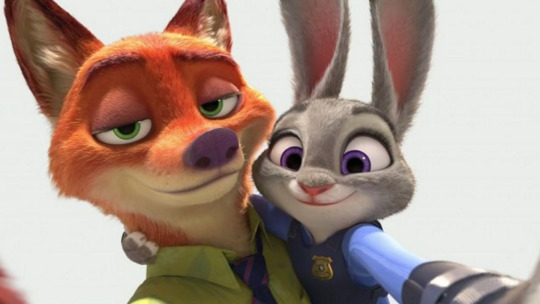
Has this been talked about to death by other people? Yes. But this is my blog and I write it for free so I can do what I want.
Note: this is not a shipping post--this is just an examination of their canonical relationship in the movie and why it rules.
At first glance, this is your typical enemies-to-friends story. I love those. But while the typical arc tends to involve two characters who can’t stand each other, who eventually develop a grudging respect for one another (often through some kind of shared ordeal) and maybe thaw into actual friendliness at the end. Zootopia packs all of that into the first half--by the midway point they are clearly not just allies, but friends, and by the end of the film they’re inseparable.

It’s important to recognize this isn’t just for the hell of it, or just to be cute--the closeness and trust they build is the linchpin of their success in the final moments of the movie.
All the reasons why, after the jump.
Something I talked about in the previous post was the messaging of Zootopia, and I don’t want to rehash it too much here. It’s a movie about prejudice, and the work it takes to overcome it. A key theme (one that it shares with Beastars, incidentally) is that friendships with those who are different from you are hard--but they are worth it.
Part 1: They Hate Each Other! (Right?)
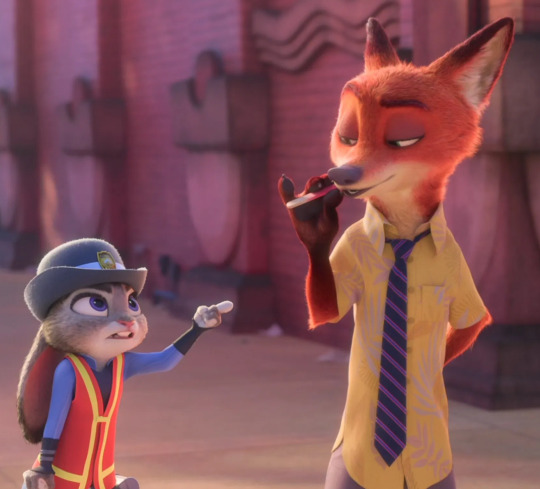
Now...it goes without saying that when these two first meet, they bounce off each other hard. Each is seeing the other at their absolute worst.
Judy can’t stand Nick because he takes every bit of optimism she has about this world and throws it back in her face. She want to use him as a prop in her vision of an equal society, where “not all foxes” are crooks. He laughs at her. He humiliates her. All he has to do is walk away, but he takes his time. He twists the knife.
For his part, Nick sees a laughably ineffectual bunny who condescends to him and threatens him with jail for the crime of...humiliating her. She may not personally be a threat to him, but she wields the institutional power of the ZPD--a power he has plenty of reason to be afraid of--and she does it irresponsibly.
On first viewing, Nick inarguably wins this exchange. He avoids arrest, reads her to absolute filth and leaves her stuck in cement.

And he makes her really sad. Nice!
But, and I don’t pretend to be the first person to have pointed this out, on second viewing it’s obvious he can guess her story so well because it’s basically his story. The only difference, in his mind, is that he’s accepted the reality that he’ll never be allowed to live the life he wants, while she is still vainly pursuing hers.
I don’t know about you, dear reader, but the people I’ve met who have always most pissed me off are the people who remind me of things I hate about myself. The people who seem to embody the flaws I’ve worked to minimize. Nick’s naive hope is what has brought him the most pain in his life. He sees this bunny full of the same naive hope, surmises that she’s facing the same failures he did and yet stubbornly refusing to learn from them. It’s irritating.
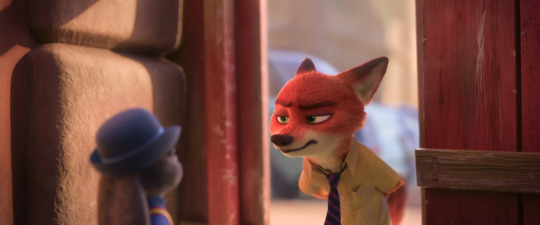
Pictured: irritation.
Maybe I am projecting, but if Nick is anything like me, he probably didn’t walk away entirely happy from this exchange. Yes, he “won,” but he was also reminded of everything about himself that he least wanted to think about.
Part 2: They Are Not Very Good at Hating Each Other
So, the thing about Judy is, she is naive. By default, she assumes people are her friend. But she’s not stupid.
Nick assumes she is stupid, not least because she hasn’t wisely given up on her dreams like he has, and...he learns that she maybe not so fun to pick on after all.
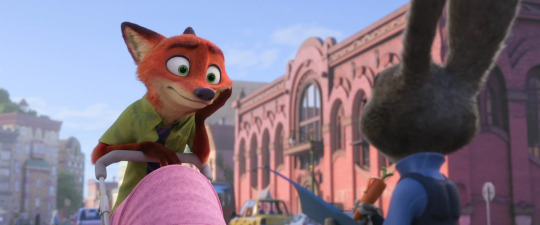
So they wind up doing the first part of this enemies-to-friends routine, allies of necessity.
So, naturally, because he is Him, he makes it his mission to torment her.


In fact, we get two whole scenes where all he does he does is watch her struggle and make this face.
The first read of this behavior is that he’s just enjoying the failures of someone he hates. He says as much later. But I would also argue--from a viewer’s perspective--Judy is ridiculously entertaining and charming throughout these encounters. She wears her heart on her sleeve, and it’s hard not to like people like that.
Is there more happening here than just schadenfreude? I won’t pretend to know for sure. But worth considering.

By the time they’re investigating the limousine, his sabotage has diminished into something more like gentle trolling. And you can’t see this face, in context...
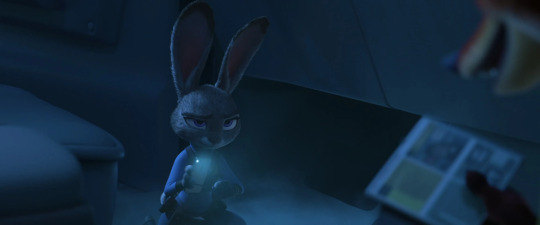
...and tell me she isn’t starting to like him, at least a little bit.
He’s also starting to help! By the time they’re past the minor detour of almost being murdered by a mob boss, he’s entirely cooperative, helping her conduct interviews and look for clues. The movie doesn’t call particular attention to this, but it almost did.
Finally, let’s look at Nick’s behavior when they’re being chased by a rabid jaguar. He could have absolutely booked it, with no regard for the cop who was blackmailing him into helping her.
These moments go by so quickly, but they’re hugely revealing of his true character, even before he defends her in front of Chief Bogo.
He picks her up when she falls.
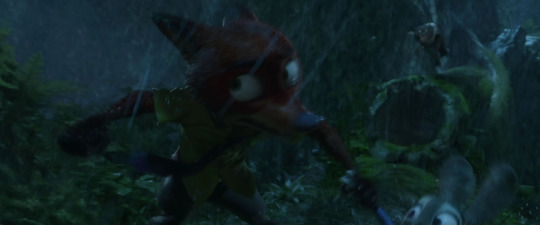
More importantly, when he gets to the skytram, his first instinct isn’t to jump in--it’s to hold the door for her:
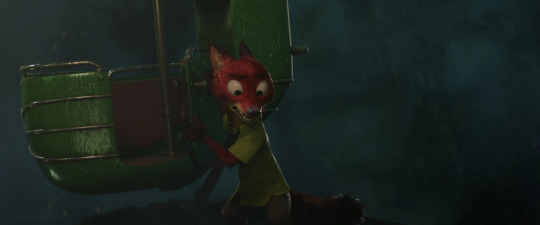
He sees she can’t make it, and she even tells him to leave without her. He doesn’t. He holds the door until he can’t anymore, and as a result he’s nearly killed.
Nick is a good boy.
Part 3: They Are Friends Now

She save his life, so he saves her job. This is a key story beat, and it’s a Disney movie, so there’s not a lot of subtlety (except how the specular highlights in Judy’s eyes fade as Bogo asks for her badge--the light literally goes out of her. Go watch).
But it’s such a sweet moment of teamwork--he was contemptuous toward her from the start because she believed in herself. This is the first time she’s simply given up in the whole movie, and he steps up. Because he believes in her now.
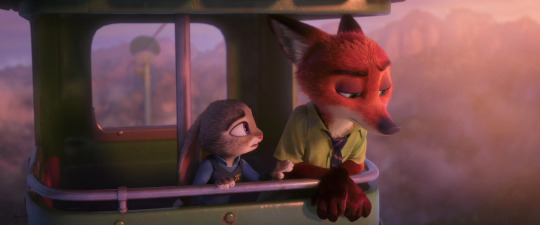
And she believes in him! Or, she wants to.
Judy’s supportiveness here is sweet, but it’s also still a little selfish. It’s not that different from their interaction at the ice cream shop, really: she wants to meet a fox who defies stereotypes, who is easy for her to like. Someone who ticks all the boxes to prove her family wrong.
When he starts being more foxy, later--self-identifying as a predator, showing his claws, challenging her--we learn that her supportiveness is conditional.
Am I being too hard on her? Sure. She’s been in bunny country her whole life. She’s new to this and she’s trying. But that’s where she’s at.
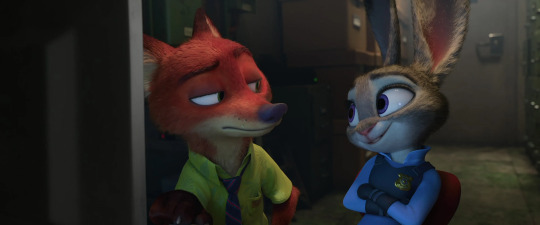
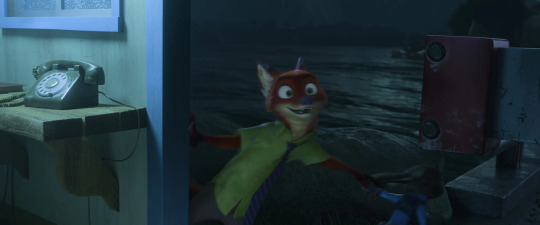
But still! They’re friends now. They’re no longer pretending they don’t like each other. Judy’s openly encouraging, Nick is fully in her corner, and we get a few cute sequences where they keep being more and more impressed with each other.
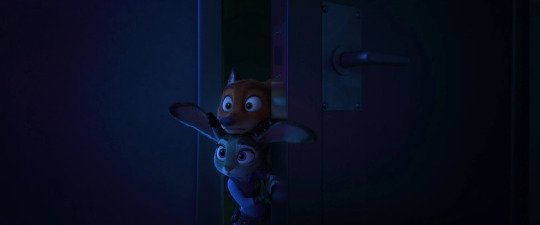
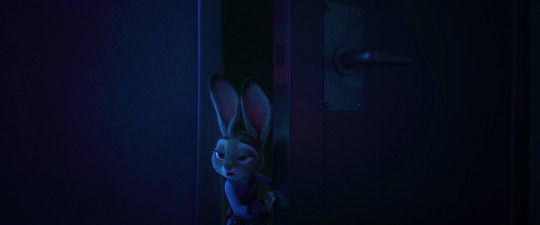
He’s still not above affectionately messing with her, and she’s getting worse at pretending to dislike it.
And he trusts her enough to let her flush him down a toilet...
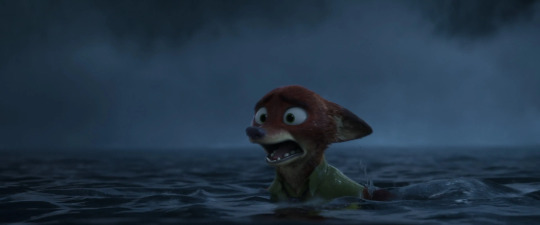
Which gives us this heartbreaking shot where he thinks she’s drowned. He cares a whole lot about this bunny.

She likes him too! Enough to want to team up on a more permanent basis. This is pretty standard-fare enemies-to-friends stuff now, but considering where we started, and considering they’ve known each other for all of two days? Not bad!
It’s clear this moment means far more to him than it does to her, too. It’s actually taken very little persuading from Judy to get him to step up and be brave and helpful and trustworthy. The fact that he’s turned around and opened up to her so fast suggests he’s been ready for an opportunity like this for his entire life, and never got it. I mean, look at his face.
The foundational flaw in her worldview is still there, though, and it’s about to do almost-irreparable damage to their whirlwind friendship.
Part 5: Fuck!
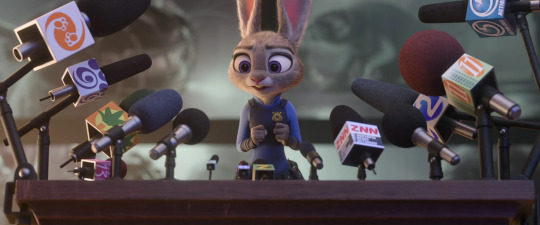
So Judy gives her press conference, and gives a great example of why police usually answer every question with “the matter is currently under investigation,” or “we’re not prepared to comment further at this time.” Honestly, though, this is on Bogo--I had coworkers who once did some press interviews, and they spent over a week doing media training. They didn’t even break a major kidnapping case. So, you know.
So she repeats some weird race science stuff she assumes is true because someone in a lab coat said it, which is amusingly similar to how race science (or “race realism”) often propagates--people with low-rent doctorates from crappy universities write a bunch of scientifically shoddy material and people say “well, he has a PhD!”

And then Nick has a PTSD flashback? I don’t want to be irresponsible and make an armchair diagnosis, but also...that is absolutely what is depicted on screen.
You’re not immediately “better” after something like this, which is why I cut Nick a bit of slack when he basically blows up their friendship.

Judy...doesn’t get it. It’s completely heartbreaking, because she likes him, and doesn’t understand why he’s mad, and isn’t self-reflective enough to stop and think maybe he has a point. Not until it’s too late. He tests her, and she fails.
Their friendship has always been a little inequal. He’s trusted her with everything, shown her his deepest vulnerabilities. She’s never trusted him completely.
So he leaves.

I don’t want to impugn her professionalism by suggesting she wouldn’t have quit the force if she hadn’t had that friendship-ending fight, but, you know. Maybe.
This is the second time she gives up, and this time he’s not there to pick her up again.
Judy is intensely goal-oriented, and I don’t think she realized what Nick’s friendship meant to her, as the first person in the city who truly believed in her, until it was too late. Judy is sweet and well-meaning but emotional intelligence is not really her strong suit (which is actually cool to see in a female Disney protagonist, imo).
So, while it would have been nice for her to track Nick down immediately and apologize, I think it makes sense for them to spend time apart. Her own self-perception has been shattered, and she needs time to figure out how she went so wrong.
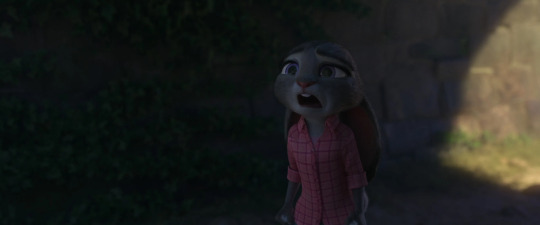
So when she does come back, she delivers one of the best animated apologies I’ve ever seen. Only AtLA compares, in my mind.
Part 6: They Are Much Better Friends Now
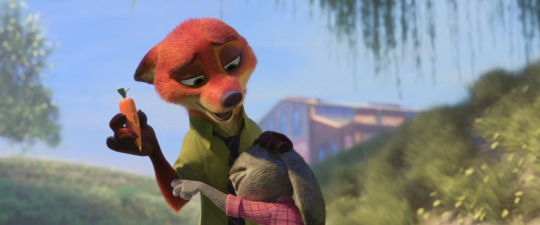
Nick forgives her, because of course he does.
(Sidebar--people talk about how he kept her carrot pen the whole time they were apart. He also kept his handkerchief from Ranger Scouts, AND he only wears shirts that match the wallpaper in his mother’s house. He desperately needs a hug.)
Credit to Nick also, who can’t fight and has no police training whatsoever, who has multiple times been almost killed helping her out, now agreeing to help her out again. She’s not even threatening him with jail this time!
We, the viewers, are then rewarded with this great montage of them being best friends.
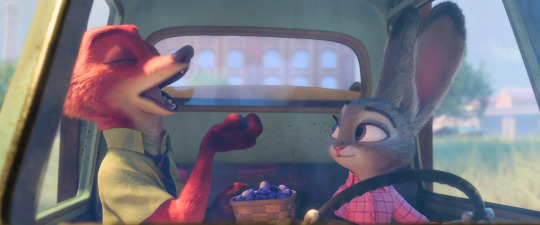
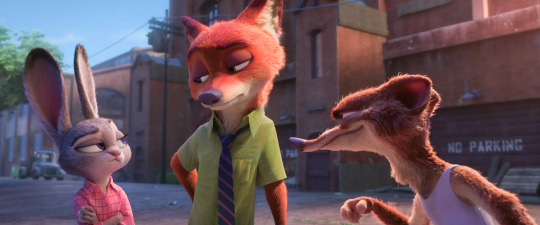
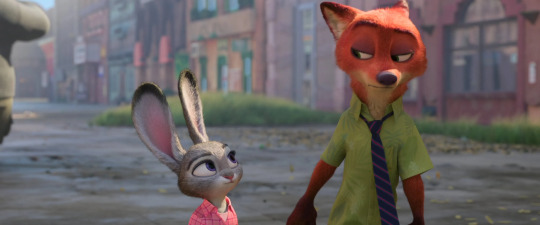
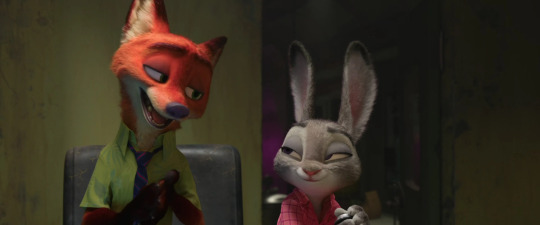
She’s finally stopped pretending not to be amused by his shenanigans.
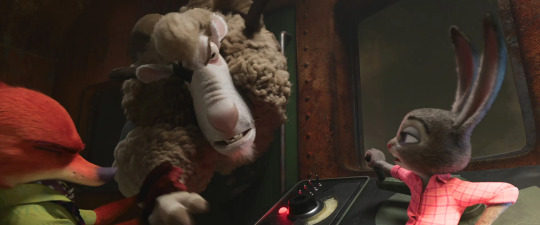
(One other sidebar here--Nick is canonically a really gentle character. For all their adventuring, this is only time in the movie he gets physical with anyone: to protect the bunny. Again, he definitely can’t fight and immediately gets smacked across the room. But it’s the thought that counts, right?)


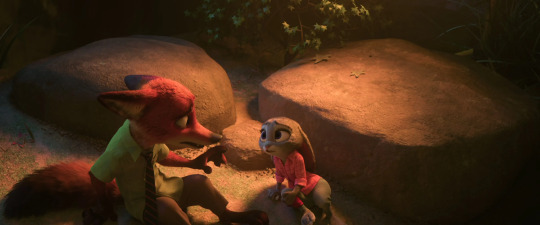
Per the post title, more visual evidence of them really liking each other.
Judy trips on a dead body, and here we get the second time in the movie that Judy tells Nick to leave without her, and he won’t--this time, he refuses explicitly.
Which then gives us the opportunity for the big moment--the culmination of all this care and intimacy and trust.
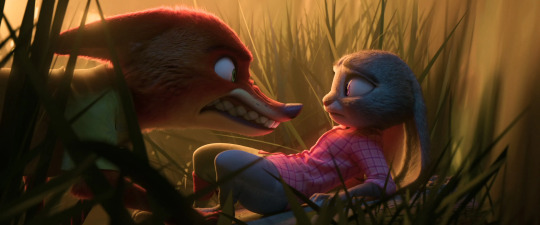
In order to con Bellwether, she lets him stalk her, and bite her throat. This has been often pointed out, but it’s important--throughout the movie, Judy’s wriggling rabbit nose has been used as a signifier of fear and suspicion. It wriggles when she’s spying on Nick at the beginning. It wriggles like hell when he confronts her after her press conference.
Not here. Doesn’t move. It’s a great, clearly intentional animation choice that tells a close observer (or more likely, a repeat viewer) that she’s completely unafraid.
She trusts him.
I could write a whole other post about how well-scripted this movie is, how every scene is doing half a dozen different things, but the way the personal and the professional come together here, the way the threads of prejudice and friendship and the police case all tie together in this moment. It’s good shit.
This is basically where things end, in terms of character development, but we get a bunch more shots of them clearly adoring each other:
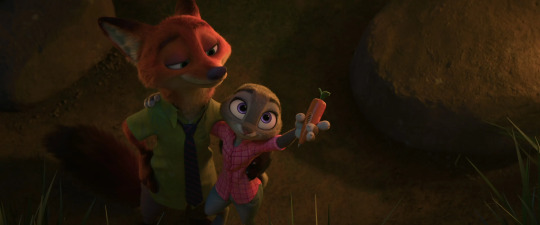

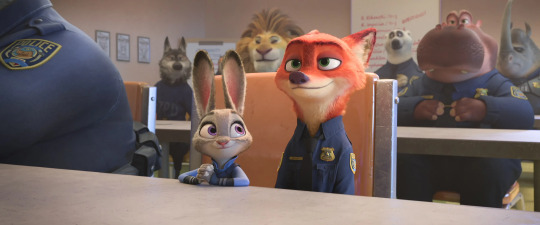
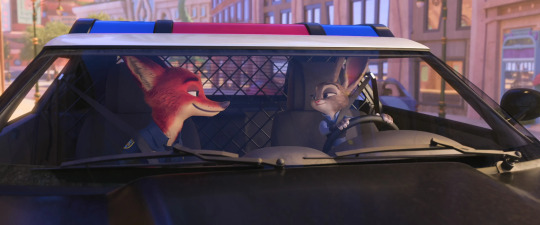
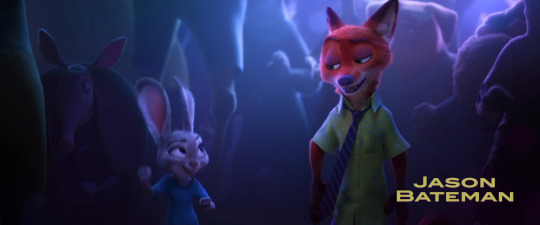
So there it is.
To sum up, certainly not suggesting this movie invented “characters liking each other,” or anything like that. But it goes above and beyond in portraying a friendship that’s not just one born of circumstance, one that’s authentic and unmistakably loving. Characters who enjoy spending time with each other, regardless of what’s going on around them.
I hope everyone is able to experience friendships like that. I absolutely treasure the few I have.
Appendix: The Shipping Thing
I hope I’ve made all this ship-agnostic, which was my intention. I personally like the ship, and I think the reason it resonates with people is because that love and trust and closeness is clearly there, and a romantic relationship creates a lot more easy opportunities for dialing those things up even higher.
I would also argue, if pressed, that the amount of teasing and physicality that happens reads as pretty flirty. If they were humans I knew in real life, I’d definitely think there was something going on there. But I’m an American, where touching and emotional intimacy tends to be read as romantic. Also, animals are a lot more cuddly than humans. So who knows? I think it’s perfectly reasonable to read them as platonic friends until the end of time.
But, one way or another, they love each other a lot. Shout out to this, one of the most emotionally rewarding relationships I’ve ever seen in a cartoon.
244 notes
·
View notes